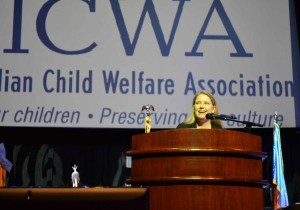The Supreme Court decision will impact every tribe in the country

Published April 11, 2013 in ICTMN
After the April 8 press conference at Hard Rock Hotel and Casino Tulsa in which the National Indian Child Welfare Association (NICWA) and the Cherokee Nation shared the latest developments in the case Adoptive Couple v. Baby Girl, Indian Country Today Media Network spoke with Chrissi Nimmo, the counsel of record for the Cherokee Nation.
In the “Baby Veronica Case” that has generated significant media interest in the past year, Cherokee Nation tribal member Dusten Brown is fighting to retain custody of his daughter. This particular case has consisted of a vast coalition of attorneys and support from tribes and tribal organizations, including the Native American Rights Fund, the National Congress of American Indians and NICWA. With future implications of the Indian Child Welfare Act on the line, the case will be heard in the United States Supreme Court on April 16, with an actual decision taking place by June of this year.
What has been your involvement?
I represented Cherokee Nation in South Carolina in family court in September 2011 when it went to trial the first time. It was a four-day trial in Charleston [South Carolina]. I then represented Cherokee Nation and presented oral argument at the South Carolina Supreme Court when it was appealed there. I am also counsel of record for the United States Supreme Court.
Do you consider the attention to the Indian Child Welfare Act positive or negative right now?
I think it’s both. This case has grown a lot of attention to the Indian Child Welfare Act. A lot of people who don’t understand it, don’t like it. I also think it’s good in that more people know about it. Once people really understand why the law was passed and what it’s intended to do and what it is doing, it sometimes changes from bad attention to good intention.
If the Supreme Court rules in favor of Dusten Brown and his family, what will this mean for the Indian Child Welfare Act?
There are splits in the state court system. One way or the other, the Supreme Court will answer those questions. If they affirm the lower court decision, it’s a strong statement to state courts across the country that they need to follow the Indian Child Welfare Act to a T.
What would happen if they rule against the Indian Child Welfare Act in the Supreme Court?
It would be devastating for Indian children, but it would be devastating for tribes as well. There are bigger Indian law issues wrapped up in this case. A detrimental decision could call into question several other federal laws that deal with tribes as tribal organizations but also as Natives as individuals.
What has the preparation been like for this case?
For the last four months, I’ve worked on nothing but this case. I was fortunate to have other co-workers that could take over my other duties.
What are you anticipating from the adoptive couple side of the case?
We know what their legal arguments are, because the briefs are already all done. That’s where the oral argument is an hour total. In this case, four different attorneys are speaking. Most of that time is spent with the Justices asking questions. I don’t think there’s going to be anything that’s a surprise.
How will this case change the Indian Child Welfare Act?
I think it’s one of two outcomes. If what we believe happens and what we think should legally happen, it strengthens the enforcement of the Indian Child Welfare Act. The other situation is a loss for a father of the Cherokee Nation. It would undo [over] 35 years of work on the Indian Child Welfare Act. Any adverse decision would impact every tribe in the country. There’s no doubt.